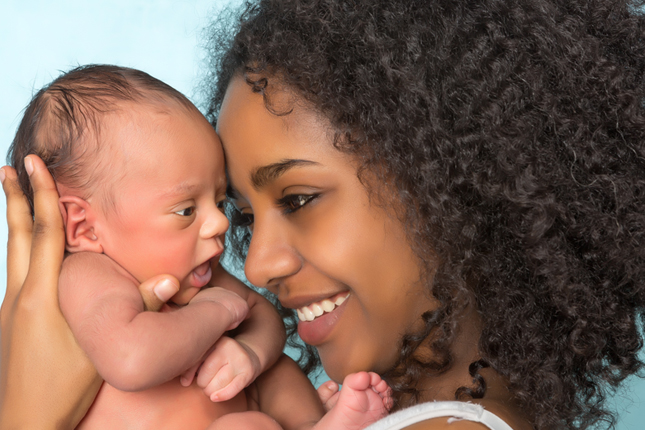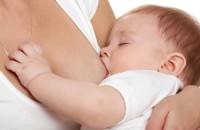The Boob Group
Milk Sharing: Mother to Mother
[00:00:00]
Please be advised, this transcription was performed from a company independent of New Mommy Media, LLC. As such, translation was required which may alter the accuracy of the transcription.
[Theme Music]
SUNNY GAULT: This episode of The Boob Group is brought to you by Rumina Nursingwear. Hands-free pumping and nursing tanks and bras to support your breastfeeding goals. Visit www.pumpandnurse.com and save 20% with promo code BOOBGROUP20.
LEILANI WILDE: When a mother needs more milk for her baby, who can she turn to? What are the benefits of milk sharing and what are the common concerns? How does milk donated from other mothers compare to other forms of supplementation? Today, we're talking with moms who have donated milk and received milk from other breastfeeding moms. This is The Boob Group.
[Theme Music/Intro]
LEILANI WILDE: Welcome to The Boob Group, broadcasting from the birth education center of San Diego. The Boob Group is your weekly online, on the go support group for all things related to breastfeeding. I’m your host, Leilani Wilde, I’m also an IBCLC and owner of Leilani’s Lactation and Doula Services.
Thanks for joining today. Are you a member of The Boob Group Club? Our members get bonus content after each new show. Transcripts and special discounts. Check out our website at www.newmommymedia.com for more information. Now, Sunny is going to tell us more about our virtual panelist program.
SUNNY GAULT: Yes, hey everybody! So if you are not here in the studio with us while we're recording here in beautiful San Diego, we still want you to be part of the conversation. There are a couple different ways you can do that: If you are on Twitter or Facebook you can follow us for The Boob Group, and follow the hashtag #BoobGroupVP. VP actually stands for Virtual Panelist.
I am on Facebook and twitter right now, I'm going to be posting some of the same questions we're going to be talking about here in the studio so it's a great way for you guys to be part of the conversation, and part of each of our episodes. So again, Facebook and Twitter, follow the hashtag #BoobGroupVP. I'd like to introduce you to one of our panelists today, Emily.
EMILY: Hi, my name is Emily, I'm 32 years old, I'm an attorney, I have one girl, Mia, who is six months old and I received donor milk.
JENNIFER: Hello, my name is Jennifer, I'm 34 years old, I'm a paralegal, I have two children, a five year old girl and an almost two year old boy. I have breastfed both of them and I have donated milk.
VIVIANA: Hi, my name is Viviana, I'm 24 years old, I'm currently a stay-at-home mommy. I breastfeed my daughter and I have two boys, and I donated milk to a friend that I met through another friend.
[Theme Music]
SUNNY GAULT: Okay, so before we start today's show, we do have a breastfeeding headline that we want to share with you guys. I know most of you guys are on social media, and so this is something that you may have personal experience with.
There's been a lot in the headlines about Instagram and Facebook and what kind of breastfeeding selfies they allow, because as you know sometimes your breastfeeding photos can be a little bit revealing, and so some people aren’t very fond of that. These sites have been going back and forth to try to figure out how to basically make everybody happy.
Facebook and Instagram in particular have loosened their restrictions, so more breastfeeding moms are posting their breastfeeding selfies. This article is actually about the other side of that. Moms who weren’t able to breastfeed their babies. They feel a little bit bad when they see these photos, it's kind of a reminder of them, as quote unquote this article talks about failing as a mom, failing their child, I'm just wondering what you guys' take is take is on this.
Have you ever posted any breastfeeding selfies, did you think about how this could impact other people? What are your overall thoughts?
EMILY: I have not posted any breastfeeding selfies, I think it would be hard to comment on it without knowing the context of the selfie or any comment that is below it, but I think just a picture of a mother breastfeeding her child should not necessarily have a negative connotation or offend someone who did not breastfeed their child.
VIVIANA: I have also not posted a breastfeeding selfie, and I definitely had some issues with breastfeeding, so I can understand someone feeling a little twinge of envy at somebody who's been able to breastfeed easily, but in general I definitely support Facebook and any social media site loosening the rules, just because I think that it's not any way sexual, and that's normally when we're asking... I don’t see it as being revealing in the same way. That's usually when we're putting limitations on something, so I generally think it's a positive thing.
SUNNY GAULT: Yeah. Any thoughts?
JENNIFER: I agree with Emily, I don’t think that there should be any issues with posting pictures, it's a natural thing and I don’t think there should be any negative comments or any negative views towards that. You're just feeding your child.
SUNNY GAULT: Right.
JENNIFER: There's no problem with that, I don’t think so. I don’t think there should be.
SUNNY GAULT: Yeah. We posted this article actually on our Facebook page and we did get some comments from some of the people that follow our page, so this actually comes from Rachel Harric. I thought Rachel had an interesting point, she says "We all get judged no matter what we do, and we are the ones judging ourselves.
Am I going to get upset every time a skinny person posts a picture, since I'm fat? Should I not post a picture of my child, because someone may have experienced a pregnancy loss? Will someone's post about a new job offend someone who's unemployed?" So you see where she's going with this. Where do we draw the line?
LEILANI WILDE: We're always looking for some reason to have some sort of disagreement or judgment, it's just human nature unfortunately. This is the real world.
SUNNY GAULT: And they’ve come up with the hashtag #Bressure, like pressure, like breastfeeding pressure. So we'll start using that too, just to see what are you guys' thoughts on this. So #Bressure. All right, thanks for your thoughts, Ladies.
[Theme Music]
SUNNY GAULT: Today on The Boob Group we're discussing supplementing our babies with milk shared between mothers and why moms believe the benefits outweigh the risk. Thanks to everyone for joining us today, and welcome to the show. Emily, how old was your baby when you started supplementing, and how long did you need to do it for?
EMILY: My baby was one day old when I started supplementing it. I did it for probably about the first week, until my milk came in. she had a tongue tie and was having trouble starting to feed and eat, so that’s why we decided to go with supplementation.
LEILANI WILDE: Right. I remember that, and she had trouble transferring, and so the concern was weight loss and you were not in a hospital setting.
EMILY: Correct. Actually, the hospital had sent us home. We had a consultation with a lactation consultant and I guess she was making the right motions, but actually wasn’t transferring any milk so we needed to figure out kind of a stopgap until my milk came in.
LEILANI WILDE: Preventative measures.
EMILY: Yes.
LEILANI WILDE: Emily, did you use any other supplements besides donor milk?
EMILY: We realized that she hadn’t eaten anything late at night, so we did one formula feeding because it was very last minute, and then we switched to donor milk.
LEILANI WILDE: Okay, great. You know, one of the questions that we have is, is breast milk or formula better than the other? Breast milk being natural is better than formula as far as the properties go, the antibodies that are naturally given. Some of the advantages to formula is the contamination of the formula.
We've heard of some recent stories where some of the formulas were pulled off the shelves, because of contaminations, and then babies that are receiving formula have a higher risk of middle ear infection, eczema, gastrointestinal infections, lower respiratory track diseases, asthma, the risk of type 1 and type 2 diabetes, also childhood leukemia and sudden infant death syndrome. So where did you hear about donor milk, Emily?
EMILY: I heard about it from you. We were trying to figure out what to do until my milk came in and you asked if we had any friends or even just knew of anybody who was currently breastfeeding, and we were able to think of somebody who was nice enough to give us milk on very short notice. I think we called her at 10 o'clock or 11 o'clock at night and she brought it over at 6 AM the next morning. So yeah, that's how we got our introduction.
LEILANI WILDE: And she's here with us today.
EMILY: Yes. Since she is here with us today, she was also nice enough to come.
LEILANI WILDE: What did you think about that, Jennifer?
JENNIFER: Well, at the time I didn't think much more than there's a little baby out there that needs some food in her belly, so it was just a very natural "Okay, let's pump, let's get some milk and get it over to them as fast as I can." I think after, I kind of have the same concerns that you had brought up, like is this sterile enough? Is this okay? Is this better than formula?
The food I eat, my milk is probably developed to meet the needs of my... I think he was 18 months old at the time as opposed to a newborn baby, but I did go back to "But this is better than formula." So you do have those questions in your mind, but I felt that this was a better choice than formula, and I was more than happy to help them out.
LEILANI WILDE: There is an age difference as far as the type of milk, the change and the quality and all of that, but in general it's nothing to worry about because overall it's still better than formula. The breast milk contains many antibodies that aren’t in the formula. Viviana, we know that you have been a donor. Can you tell us your experience?
VIVIANA: Yes, I actually had a fridge full of milk. I had been pumping at least twice or three times after every feeding for the first month of coming home from the hospital, and the milk was just sitting there. I was strictly feeding the baby, trying to not use the bottle. If my boob is there and available, then why not use it.
So I had a lot of milk in my fridge, it was actually taking the majority of the room in my fridge, and I had the lady who encapsulated my placenta, Nova give me a call and ask me to see if she could have that milk for another mother who had completely dried up. Unfortunately the mother and her husband didn't really exactly agree on accepting the milk, so she had me give it to a different woman that actually wasn’t producing enough milk.
Her name is Amanda and she took all that milk and actually, she just came by yesterday and picked up another... I think 20 or 25 bags of milk I had just been pumping around the clock for her baby, so she could have her little tummy full and not have to worry about her mom. Unfortunately she couldn’t make enough, but she's working on it and she's slowly but surely getting her milk back, so it's helping her out.
LEILANI WILDE: Did anyone try to encourage you to use formula instead once you told people that you were using donor milk? Emily?
EMILY: You know, I didn't tell a lot of people because I didn't want to hear that I should be using formula just based on what I know of friends and family. I kind of knew what their reactions would be, so I was happy with the decision and you know there's so many things when you have a new baby, with people telling you what you should and should not be doing, that I just decided this was my decision. My husband and I were happy with it, and we didn't even need to tell people necessarily.
LEILANI WILDE: And did you experience any negative effects from receiving the donor milk?
EMILY: No, I thought it was very kind of Jennifer to share the milk with us. I had obviously anticipated breastfeeding myself, but I think I quickly learned that I was going to have to compromise. I thought that breast milk was, even if it wasn’t mine, or even if it was meant more for a baby that was 18 months as opposed to a newborn, I just liked the idea of it better and it made me feel more comfortable.
LEILANI WILDE: When we come back, we will discuss the benefits and the risks of donor milk. We'll be right back.
[Theme Music]
SUNNY GAULT: Looking for all-in-one tanks and bras to help you easily transition from pump to baby? Rumina Nursingwear’s Pump & Nurse collection is designed for your unique body, to support your breastfeeding goals and your busy new lifestyle. Simple, hands-free pumping with no additional straps, hooks or Velcro. Comfortable all day support for busy multitasking moms, and convenient full skin-to-skin nursing. Plus, Boob Group listeners save 20% with promo code BOOBGROUP20. Rumina Nursingwear – Simple, comfortable and convenient. Visit their website at pumpandnurse.com and save today!
[Theme Music]
LEILANI WILDE: Welcome back to the show, today we're talking about milk sharing from mother to mother. What are some of the benefits and risks of using mother to mother donor milk? One of the benefits of using mother to mother milk is that it is accessible.
For some people that are in remote areas it might be hard to get to donor milk from a milk bank. Also the expense of milk from a milk bank, it can range from 60 to 90 dollars per day, though they do say some of the insurance companies will cover all, or a portion of it. Also the milk banks say that they could potentially offer some donated milk from them as well, but you do need to get authorization.
In regards to the milk banks, most of that milk is actually used for premature babies and the NICU, so there isn't a large amount of donor milk given to the milk banks, they're actually short on it, so they have to offer it to the premature babies first. As a donor to another mother in need, she finds that she's actually maybe even helping a baby survive. She gets joy out of being a part of someone else's success, especially when she's a mom, she understands the need to protect the newborn.
SUNNY GAULT: Ladies, what benefits do you feel like you had? Emily?
EMILY: I felt a huge sense of relief that my baby was getting breast milk, even if it couldn’t be from me. I feel like there's always new articles or research coming out about why breast milk is better than formula, and they still don’t know all of the properties and interactions that breast milk has, or even all of the components, so I just feel like my daughter might be benefiting for her health in the future in ways that I don’t even know about now. I just felt like I was able to provide her with something that's really important.
LEILANI WILDE: Jennifer, what kind of benefits did you have in actually being the donor?
JENNIFER: Well emotionally it was nice to know that you're helping a family and a little baby in need, and it was also nice to know that there was something useful that could’ve been done with the milk that I had left over from Hunter that he wasn’t using.
LEILANI WILDE: You kind of feel like you're saving the day, right?
JENNIFER: Yeah.
LEILANI WILDE: I think everyone kind of feels that way. Viviana?
VIVIANA: I actually felt really good about it. I always have had the motto "breastfed babies are the beast babies," just because it's so much better for them. The formula sometimes makes her tummy hurt, and gives them ear infections, so yeah I felt really good. It made me feel like I served a purpose for someone who needed it, and now my daughter has a milk sibling.
SUNNY GAULT: I love that, that's great.
LEILANI WILDE: In regards to the legalities of using donor milk from mother to mother, there actually isn't any rule or regulation as far as a legal standpoint that I'm aware of, or that is current today. There are some risks in sharing mother to mother milk.
According to American Academy of Pediatrics, the [phonetic] Lalitu League and the FDA do not condone informal sharing of breast milk, because of concerns over infection and contamination, but interestingly enough the World Health Organization lists wet nursing and milk banks as being equal alternatives when the mother's own milk is not available.
The concerns I think most of us have is how safe is it from another mother? When we do our research, we can find out that with all the protection and safety guidelines, we find that there has not been any reported incidents of any negative effects of using another mother's milk. Mothers are encouraged to fully research the available options in order to make an informed decision.
Eats on Feets is a website that you can go to, and they actually have four pillars that they recommend. Informed choice, knowing what your options are, asking the moms, kind of screening them really and asking them if they drink alcohol, if they smoke cigarettes or if they take any medications, those kinds of things. Or safe handling. Are they actually washing the parts safely, are they washing their hands before handling the milk, are they putting it in clean containers, are they storing it in the refrigerator or the freezer safely?
And then there's home pasteurization where you want to maybe bring up the temperature of the breast milk up to right before a boil, just to maybe kill off any bacteria or extra germs that you could easily access too. Some of the questions that you might want to ask when you're thinking about donor milk: You might want to question the mom's history or ask for blood test results.
That is one way to do it, the other way is to just have a little bit of history on them, whether or not they are consuming alcohol or drugs, or if they have a history of herpes. If they do, and if it's at the breast, they shouldn’t be actually breastfeeding their baby themselves. Just having a general understanding of the minimal risks that are out there, and knowing how to ask those questions.
Moms that are willing to donate their milk, they're feeding their babies and they want to do what's right for them too. One of the other things that I can think about at the moment is some babies are sensitive to cow protein, so you might be asking another mother when she's donating milk, "Are you consuming dairy?" Because if she's consuming dairy and your baby is sensitive to cow protein, you're going to want to ask her to eliminate that from her diet or you may have to ask another mother that is dairy-free.
Viviana, what precautions did you take in order to provide milk that was safe to give to another baby?
VIVIANA: I had done some reading on the net to make sure that I was okay to donate, and I just made sure that that milk was deep in the freezer. I ate healthy, I made sure that I was healthy to feed the baby, because I am feeding my baby as well.
After I got pumping, I would put the milk in the bags and straight to the freezer to avoid letting it sit. Even 15 minutes, they could get bacteria. I read online that the longer you let the milk sit unrefrigerated, the more likely it will develop or get some bacteria, so just quickly pump, get it in the bag and put it in the freezer.
Other than that, yeah, I just made sure that I ate healthy and I always washed my hands when I was handling the milk, cleaned my breast before I pumped, I just examined myself to make sure I was good.
LEILANI WILDE: Good, did anyone ask you if you had taken medication or drank any alcohol or smoked?
VIVIANA: Yes. She did, she asked me if I smoked, if I had a clean bill of health, if I had any diseases that would pass through the milk. My answer to that was no, I didn't have anything that would pass through it.
LEILANI WILDE: And she didn't ask for blood results or anything like that?
VIVIANA: No, she did not, but that’s one thing that I did ask Nova about. "Hey, do I have to go get bloodwork done, do I have to go send it up to San Francisco to see if it's okay for me to donate the milk?" She said it was completely fine, so I just went through the process of just making sure that I was good.
LEILANI WILDE: Do you see yourself donating milk for a longer length of time, not just to this mom but maybe to others?
VIVIANA: Yes, possibly. I plan on breastfeeding until my daughter is 2. I wouldn’t mind doing it, I think the babies need it and it's better for them, so I would love to do it if someone else needed it.
LEILANI WILDE: Great, great. As we know, breast milk does continually change and adjust to our baby's needs, so no matter how old they are they can still take in the milk. A lot of people think that once they reach a year old, that they have to start giving them cow milk. We're the only species that drinks another species' milk, so it's kind of interesting. If you consider the whole picture.
Breast milk is always going to be best for our babies, and they'll continue to be protected with the antibodies that are naturally in the breast milk. Thank you so much, panelists, for sharing your stories of using mother-to-mother donor milk, and for our Boob Group club members, our conversation will continue after the end of this show as we will discuss the resources available to you in your local community. For more information about our Boob Group Club, please visit our website at www.newmommymedia.com
[Theme Music]
COURTNEY MELVETH: So here's a question from one of our listeners. This is from A. Carter, and what she asked was "I'm active-duty military and currently breastfeeding my 3-month-old. I pump while at work and breastfeed while at home. Come January, I will be going off to school for training for two months.
My little one will be 8.5 months at this point. I still want to continue to breastfeed when I get back. I will still take the required steps to keep my milk supply up by the pump, but will the relationship be tarnished, or can I continue it when I get back?
VERONICA TINGZON: Hi, this is Veronica Tingzon, international board-certified lactation consultant and private practice and hospital-based lactation consultant in the San Diego area. First and foremost, I want to say thank you so much for serving, thank you for helping to protect our freedom and or doing what you do and putting your life out there for us every day.
Your question about going to a training for two months while your baby has been breastfed and your baby will be about 8 months old at that point in time, there's no guarantee. It could ruin the breastfeeding relationship, it might not. Continuing to pump and protecting the milk supply absolutely is a must, and at the time when you come back, the baby will be about 10 months old and either the baby will take the breast, or the baby won't.
There are ways to kind of do what we call rebirthing. Being in a warm bathtub, laying your baby skin to skin on you and having her find her way to migrate back to the breast might be a way to do it, but at that point in time your baby has formed opinions of her own and she'll be the determinant on whether yes, we're going to breastfeed again, or no we're not going to.
I wish there was a more concrete or definite answer, but unfortunately, babies are human beings and they have opinions of their own. I'm hoping that the relationship can be preserved, but please do continue to pump because even if you can't preserve that breastfeeding relationship, it'd be wonderful if you could still give your milk to the baby.
A tip for getting milk back to the baby, you can always get dry ice and a Styrofoam cooler and ship the milk back to whoever's going to be her caretaker. Your husband or partner, your mom or your dad, you can ship it to their address so that they can give your milk while you're gone. I hope that helps, and good luck with everything!
[Theme Music]
LEILANI WILDE: That wraps up our show for today. We appreciate you listening to The Boob Group.
Don’t forget to check out our sister shows:
• Preggie Pals for expecting parents
• Parent Savers for moms and dads with newborns, infants and toddlers
• Twin Talks, for our show with parents of multiples.
Thanks for listening to The Boob Group: “Your judgment-free breastfeeding resource.”
[Disclaimer]
This has been a New Mommy Media production. Information and material contained in this episode are presented for educational purposes only. Statements and opinions expressed in this episode are not necessarily those of New Mommy Media and should not be considered facts. Though information in which areas are related to be accurate, it is not intended to replace or substitute for professional, Medical or advisor care and should not be used for diagnosing or treating health care problem or disease or prescribing any medications. If you have questions or concerns regarding your physical or mental health or the health of your baby, please seek assistance from a qualified health care provider.
SUNNY GAULT: New Mommy Media is expanding our line up of shows for new and expecting parents. If you have an idea for a new series or if you’re a business or organization interested in joining our network of shows through a co-branded podcast, visit www.NewMommyMedia.com .
[00:22:13]
[End of Audio]











